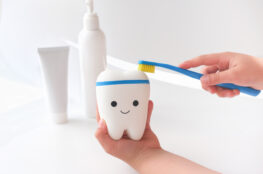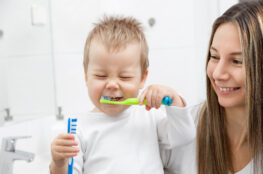Yes, it’s time we talked about the big bad monster: sugar. We know your kids love the stuff. Don’t we all if we’re honest? The problem is that allowing teeth to be in contact with high quantities of sugar over long periods of time can really affect oral health, general health and even self-esteem in the long run. This can particularly be the case among children and young people.
According to the British Dental Association, “official data has revealed an 18% increase in the number of [tooth] extractions taking place on children in hospitals since 2012.” They also state that these (mostly preventable) extractions in young people are annually “costing the NHS £205 million.” That’s a lot of tax-payers money paying for the avoidable damage from sugary and acidic foods and beverages. Action on Sugar states that ’Tooth decay is the leading cause for hospitalisation among 5-9 year olds in the UK, with 26,000 children being hospitalised each year due to tooth decay – in other words, 500 each week.’
Manufacturers don’t help parents much though. Despite the hefty sugar tax on unhealthy products there are still so many foods and drinks on the supermarket shelves that are marketed for children but contain obscene amounts of sugar. To try and de-bunk some sugary myths, we’ve put together some answers to the questions we get a lot about the effect sugar has on teeth and especially children’s teeth.
How does Sugar harm teeth? Sugars in food and drinks play a major role in the development of dental caries. Bacteria within the plaque use the sugar as energy and release acid as a waste product, which gradually dissolves the enamel in the teeth (NHS Choices, Tooth Decay). So, there we have it. The sugar feeds the harmful bacteria in yours and your child’s mouths which can accelerate the erosion and decay process. Even though sugar does not directly harm tooth enamel, it enables the natural bacteria in our mouths to do its worst.
What about baby teeth? It’s a common misconception that children’s baby teeth, or milk teeth, aren’t as important to look after as adult teeth. We suspect that some may think this because they only last us for a fraction of our natural lives compared to adult teeth which must last us many decades. Some parents assume that if a child’s tooth falls out too early through decay, that it is not a concern, because it would have fallen out soon anyway- but premature tooth loss can certainly cause dental issues further down the line.
Baby teeth are eventually replaced by permanent teeth, but they need to stay in a child’s mouth until they come out naturally. Your child’s baby teeth keep space open for permanent teeth to replace them. If they lose a tooth too soon, the other baby teeth can move into the open space and prevent the permanent teeth from erupting correctly. This can lead to unsightly crowding of the teeth and cleaning problems. It is really important that as a parent who wants the best for their child that you are mindful of how much sugar is in your child’s diet, because these decisions can affect their oral health down the line. Having a beautiful smile they can be proud of is what we want for all our babies and you can help them grow beautiful adult teeth by looking after their baby ones.

Where is the sugar coming from? According to NHS initiative Change 4 Life, “kids are getting half their sugar intake from unhealthy snacks and sugary drinks.” It’s not only the obvious things like sweets, chocolate and cakes that contain too much sugar for our own good. The hidden sugars in our diets are just as dangerous. Check the labels on the sauces you use in your cooking and on the table to see how much sugar they contain. Lower sugar alternatives to these are available in most supermarkets. One portion of breakfast cereal can contain more sugar than a sugary fizzy drink. Drinks are certainly a source of hidden sugars too. Sujatadin.com suggests that a portion of apple juice contains almost as much sugar as a can of Coca-Cola. A normal portion of Ribena contains around 6 and a half teaspoons of sugar whereas the no added sugar variety contains less than half a teaspoon.
Drinking too much sugar can really increase the overall amount of sugar we consume per day so be mindful and look at the labels if you are unsure. Many products use a traffic light system on the label to indicate how good (or bad) for you an item is. Making sure your shopping trolley is mostly filled up with green items is a good start to reducing the amount of sugar in your family’s diets. Do remember though that the traffic light system indicates what is healthy for an average adult and children cannot process sugars, fats and salts as well as we can, so they need to consume less of these things than adults, not more.
How can parents and carers help? Simply put, you need to limit the amount of sugar your child’s teeth come into contact with and also limit the time it is on their teeth for. You can do this by restricting the occasions they are allowed sugary treats per week and by encouraging and supervising the brushing of their teeth twice daily. We’re not saying to live a sugar-free existence, (we’re not even sure it’s possible these days) and it wouldn’t necessarily be healthy either since fruits and even vegetables contain sugars and acids. We are advising that parents are mindful of the amount of sugar that goes into your child’s diet and make better choices for their health and futures. Look out for sugar-free or reduced sugar alternatives to the staple items in your cupboards next time you do your weekly shop.
Sugar not only affects dental health but too much of the stuff can lead to other health complications. Change 4 Life advises that “too much sugar is bad for children’s health as it can lead to the build-up of harmful fat on the inside that we can’t see. This fat can cause weight gain and serious diseases like type 2 diabetes, which people are getting younger than ever before, and heart disease and some cancers.”
No one wants any of these health complications for their child, so be sugar aware. If you are unsure about how sugar affects the health of young people or how much sugar is too much, we encourage you to visit the sugar subsection of the Change 4 Life website where lots of helpful information is available including tips to help you easily cut down the sugar in your family’s diet.
If you are worried about tooth decay in your child or yourself, you can contact Kennett Dental Practice here to make an appointment where we can assess and advise. Dental practices are still open in lockdown to provide routine and emergency dental services to patients. Find out about our new safety measures that are in place during the pandemic by clicking here.



